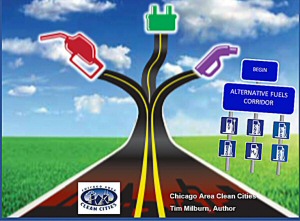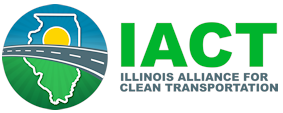Alt-Fuels Corridor Study
Illinois Alliance for Clean Transportation Coalition (IACT) is pleased to provide readers with the Alternative Fuel Corridors Study. The objectives of this study were to map the current locations and usage patterns of petroleum alternatives, evaluate criteria for siting and communicate factors for sites and the refueling market to be ready and be successful when making investments. The study concentrates on and near the main transportation corridors in the IACT region (Cook, DuPage, Kane, Lake, McHenry, and Will counties in Illinois). Alternative fuels include compressed natural gas (CNG), liquefied natural gas (LNG), propane, 20% biodiesel/80% diesel blends (B20), 85% ethanol/ 15% gasoline blends (E85), electricity, and hydrogen (H2).
The study started by mapping the existing alternative fuel sites in the six counties, in Illinois and in some case, adjacent states. A critical effort involved a series of listening session with the main stakeholders in Illinois, including fleets, retail refueling companies, highway authorities, utilities and more. These inputs were compiled into a set of recommendations for where and why to successfully site alternative fuel stations. A gap analysis was completed which considered the geospatial opportunities for siting based on mapping, and the stakeholder feedback provided other critical needs for sites to be ready and successful.
This AF Corridor Study refreshes several challenges and solutions that have been contemplated, tried and/or succeeded related to advancing the use of alternative fuels in the region. Recommendations envision logical pathways in support of economic and environmental goals, to both push and pull the changes needed for a more sustainable transportation future.
The study intends to inform planners, jurisdictional authorities, legislators, fleets, retail refuelers, and a range of other decision makers on the state of alternative fuels; characterize the ecosystem of vehicle and refueling infrastructure currently supporting these markets; and consider what it might take to advance the use of alternative fuels in the Chicago region and beyond, especially leveraging new policies that may come into being.
The document is based upon work supported by the U.S. Department of Energy, Office of Energy Efficiency and Renewable Energy (EERE), under Award Number DE-EE0007996.
To download the study, please complete the following form.


